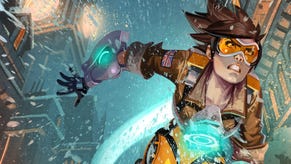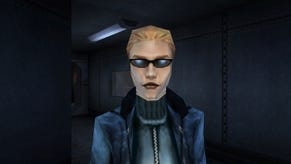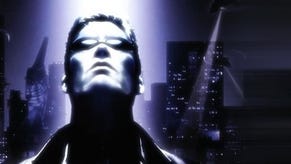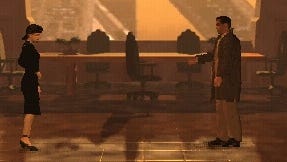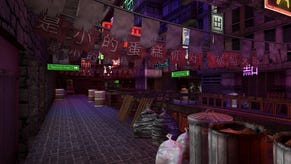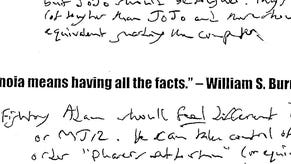Deus Ex: The Conspiracy
Review - console ports of PC games are not all good, and this isn't all good, but it's close
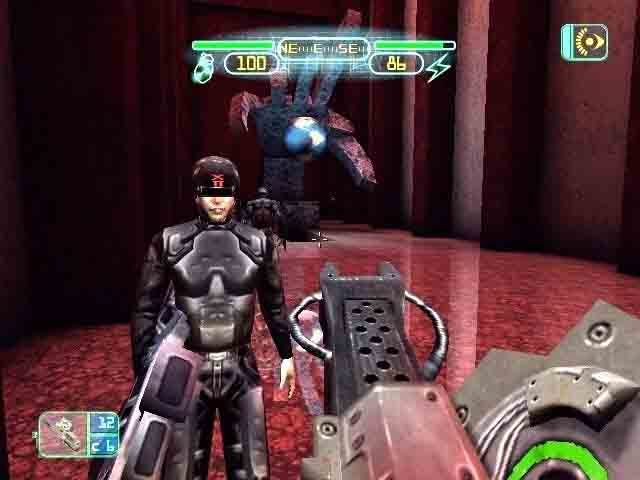
Design Is Law
Deus Ex is one of the finest games to ever grace the PC. A triumph of the Ion Storm "Design Is Law" philosophy (and perhaps the only one to date), the gritty urban tale of conspiratorial government schemes and shady corporate nastiness won the hearts of gamers aching for something different to quench their thirst for originality in the first person genre. Some two years after Warren Spector's masterpiece first hit the shelves, it's now the turn of PS2 gamers to get a taste of the action.
The player assumes the role of JC Denton, a genetically engineered counter-terrorist operative working for the global policing organisation, UNATCO. Denton's uncompromising strength, stealth and combat capabilities are a result of his nano-augmentation. These nano-augs are carried out by miniscule machines inside the subject, which manipulate key functions of the body to enhance vision, combat strength, speed and a good number of other skills. Furthermore, Denton can easily upgrade his talents through the installation of aug canisters found throughout the game world, which each give him a choice of two skills.
The clever part is that your game will take on a completely different feel depending on which skills you choose. Concentrating on strength and ballistic resistance augmentations will virtually turn Denton into a walking tank. Conversely, upgrading his ability to run silently and increasing his speed will enable you to conduct swift stealth operations without even having to pull out a riot prod for defence. Couple this with the opportunity to gradually upgrade Denton's core skills like computer hacking, swimming, weapons handling, visual enhancement and the like, and you have the opportunity to mould the game into your own kind of adventure.
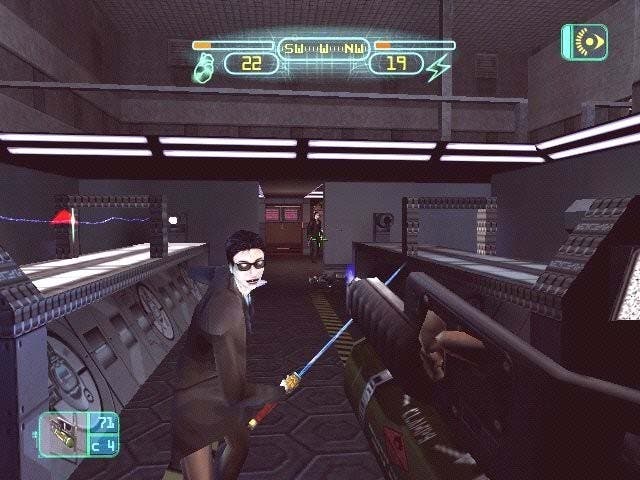
Twitchy
We were perhaps naively confident that Deus Ex wouldn't fall foul of the regimentally sloppy PC-to-console porting process, and that the game would remain as playable, accessible and involving as its older brother. However, the conversion is a rather mixed effort; in some places we're happy to say that the port has been a resounding success, and in other areas we struggle to wonder what on earth Ion Storm were thinking (as we so often do).
It seemed wise to first probe the game's training level in order to get to grips with Deus Ex's fairly complex control set, but this is where the first major gripe with the conversion crops up - the Dual Shock 2 controller just doesn't work well with first-person gaming. It's not as if it's simply a case of having to get used to the twitchy analogue aiming, because you never, ever will. Obviously this is more a failing of the hardware, though, and with a USB mouse and keyboard plugged into your PS2 you're laughing.
Heading into the game's first mission reveals a fair amount of other problems though. The first of these is how badly the PS2 handles the very clearly ageing Unreal Tournament engine, with the frame rate dropping into single figures on regular occasions. More often than not though, this is a fixture of the in-game cut scenes and not sections of gameplay, and this is perhaps due to the clear compromises in level design taken by Ion Storm to keep the framerate steady. The sprawling UNATCO constructions now fit the PS2's comparatively tiny memory capacity much better than they did the average PC when the game was originally released...
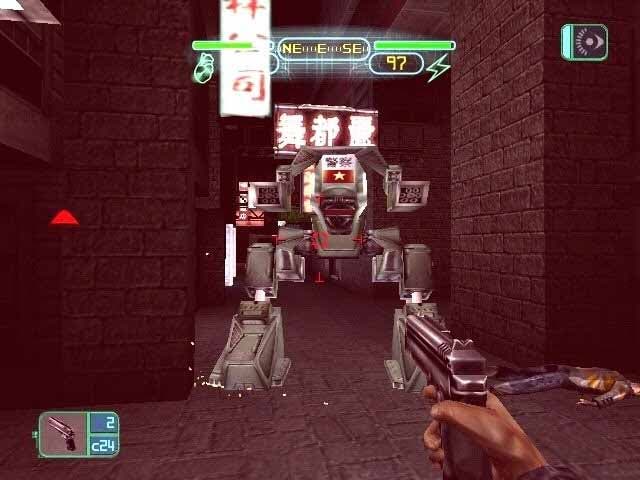
Boxy
The level designers behind the PS2 port have relied on one tactic to simplify the game's environments, and it basically boils down to chopping them up. The result is that a number of small levels form part of larger missions, connected by small tunnels and loading screens, but this doesn't always work. For example, the complete re-organisation of the Hell's Kitchen section is baffling, and a sense of direction will do you no favours here as we found ourselves stumbling around the map trying to find mission-critical locations. Unfortunately, loads occur far more often than we would have liked too, and this spoils the flow of the game in places throughout.
Other than moans and groans about the level design, there are a handful of problems. The characters themselves have been graced with much improved skin jobs, but the overall quality of texturing and the lack of architectural detail in the game is shocking by today's standards to be perfectly frank. Patchwork cement smeared across enormous slabs at the foot of huge rectangular building block constructions just doesn't cut it any more, certainly not as far as conveying a vision of tortured urban hell is concerned.
Building interiors are an improvement though, construction wise, and the multiple approach routes and attention to detail here is admirable. You can either head straight through the main entrance and get ready for a confrontation with security, or you can have a good poke around looking for a far more silent and deadly approach - through a skylight perhaps? How about this elevator shaft? That ventilation duct looks handy... you get the idea.
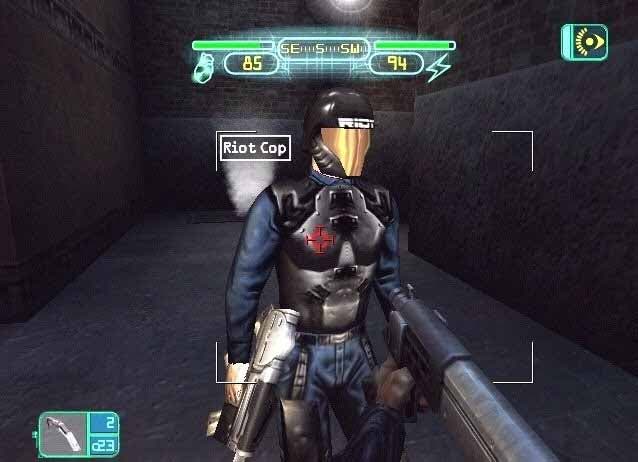
Defiant And Triumphant
But where the game falters on the visual side of things, it redeems itself tremendously in others. The new PS2-exclusive rendered cutscenes are a great deal more cinematic than the PC's wooden game engine efforts, and the sound design is utterly fantastic. Much of the soundtrack has been re-recorded with a full orchestra, and this adds to the theatrical air. Elsewhere, sound effects and voice acting are of fantastic quality, with the latter only slipping into mediocrity on rare occasions, and if you've got the hardware, proper 5.1 surround sound will enhance the experience.
What made Deus Ex such a fantastic game on the PC is still here in force, even if it does look and feel terribly haggard. The satisfying rush of diving in and out of cover to avoid the gaze of security cameras, slipping through a door without a sound to hack a security terminal, followed by the turning and aiming of the sentry turrets against unsuspecting guards is still there to savour. As is the beautifully conceived storyline and the ongoing character development - there's a narrative permeating throughout Deus Ex that most contenders couldn't hope to better.
A console conversion of a two-year-old game that looked a bit shaky when it first came out was never going to be spectacular, and Ion Storm have probably tailored the game to the format as far as they possibly could. The interface changes are splendidly thought out, offering items via a modified inventory menu seems to have worked, squeezing the myriad of functions onto the Dual Shock 2 was an impressive achievement, and the visuals have been augmented to good effect, although perhaps with less success than JC's own augmentation. Deus Ex is still an amazing, immersive and downright life-stealing game no matter what platform it's on, and Ion Storm can only be congratulated for that.


